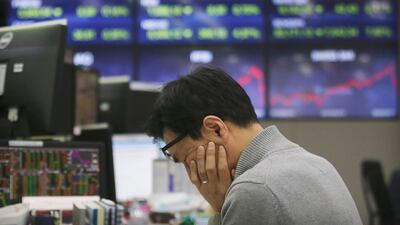GCC central banks cut rates on Monday following the biggest rate cut by the US Federal Reserve since the 2008 global financial crisis, as the world's largest economy tries to avert a recession and ensure ample liquidity in the market.
The Central Bank of the UAE cut its benchmark rate by 75 basis points after the surprise rate cut by the Fed on Sunday. The US central bank slashed rates down to near zero, said it is pushing out $700 billion in quantitative easing by shoring up its bond holdings as it looks to boost investor confidence.
The UAE central bank cut the interest rate on one-week certificates of deposits, to move interest rates in line with the upper-bound Fed funds target rate of 0.25 per cent. CDs are the monetary policy instrument through which changes in interest rates are transmitted to lenders in the UAE.
The Saudi Arabian Monetary Authority cut its repo rate by 75 basis points to 1 per cent from 1.75 per cent and the reverse repo rate by 75 basis points to 0.50 per cent from 1.25 per cent. The kingdom's central bank said its repo rate reduction is for "preserving monetary stability given evolving global developments". Kuwait's central bank also cut its interest rate by 1 per cent to 1.5 per cent, and the Central Bank of Bahrain cut rates on overnight deposits in half to 0.75 per cent, while its lending rate was reduced to 1.7 per cent, from 2.45 per cent.
The Fed had slashed its Funds rate to 0-0.25 per cent on Sunday evening, less than two weeks after a 50 basis point emergency rate cut to 1-1.25 per cent earlier this month and ahead of a meeting later this week. The central bank also signalled it would begin a programme of asset purchases, including $500 billion of treasury bonds and $200bn of mortgage-backed securities.
"The effects of the coronavirus will weigh on economic activity in the near term and pose risks to the economic outlook," the Federal Open Market Committee said in a statement explaining its move.
It added that it would continue with its near-zero rate "until it is confident that the economy has weathered recent events and is on track to achieve its maximum employment and price stability goals".
Despite the stunning move by the Fed which some analysts described as a "bazooka" it failed to stem a slide in equity markets around the world. Australia's ASX plunged 9.7 per cent - its biggest one-day fall since 1987 - while Hong Kong's Hang Seng Index fell 4 per cent, the Shanghai Composite index shed 3.4 per cent and Japan's Nikkei 225 dropped 2.5 per cent.
US markets opened sharply lower on Tuesday, with the S&P500 hitting a temporary stop limit after falling 7 per cent and the Dow Jones Industrial Average plunging 12 per cent in early trading.
European markets were also trading sharply lower with the EStoxx 50 down 9.7 per cent, Germany's Dax 30 index fell 9.4 per cent and the UK's FTSE 100 index dropped 7.7 per cent by 5.45pm UAE time.
While President Donald Trump was elated by the Fed's move, Mohamed El-Erian, the chief economic advisor to insurance giant Allianz, said he was "baffled and upset" both with what the Fed's announcement and what it hadn't announced.
"Baffled because measures more targeted at actual and potential market failures are more effective at this stage ... upset because of that damage that's being done to US and global economic well-being," Mr El-Erian said in a tweet on Monday.
In the UAE, the Dubai Financial Market index closed down 6.1 per cent and the Abu Dhabi market index was 7.8 per cent lower. The sell-off in local equities came prior to the UAE Central Bank's rate cut but after the announcement of a series of stimulus measures by the Abu Dhabi government aimed at supporting businesses. The Dubai government had announced a similar set of measures last Thursday and the UAE Central Bank had unveiled its own Dh100bn stimulus package on Saturday.
Although short-term interest rate cuts "will do very little to fight the virus-induced crisis and its negative impact on confidence and value chains", central banks' attempts to stimulate economies and inject liquidity globally are being taken in a bid to avoid a cash crunch, according to Patrik Lang, head of equity strategy research at Julius Baer.
"This may call for concerted action by all major central banks to buy extra bonds and offer further liquidity to companies outside the banking sector," Mr Lang said. Equity markets, he added, "will probably bottom once this point is reached and we would argue that this will happen sooner rather than later".


